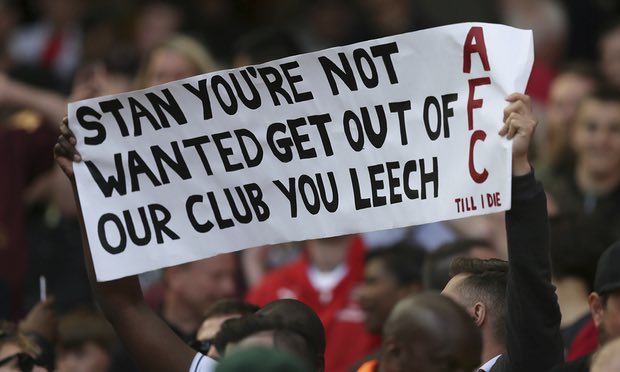The statement made by the Arsenal majority owner, Stan Kroenke – after the club failed for the first time in 20 years to finish in the Premier League top four – was clinically short, utterly unemotional, yet for all that, distinctly revealing of his motivation for involvement in the club.
The US-based owner was, as usual, not at the Emirates Stadium on Sunday, where he would have found himself in a vortex of sourness and seen protest banners including the one describing him as a “leech”. His response was not the reaction of a man with Arsenal or even football in his veins, but a brief, two-sentence statement to the stock exchange.
Even that was not a reaction to the final-day shakeout of the league table, in which Manchester City and Liverpool claimed the final two qualification places behind Chelsea and Arsenal’s keenest rivals, Tottenham Hotspur, for next season’s Champions League. Instead it was a blunt and somewhat insensitive clarification three days after the leaking of Friday’s news that he had turned down a £1bn offer for his 67% shareholding from the Russian-Uzbek billionaire Alisher Usmanov, himself a 30% stakeholder.
The fact that a rare Kroenke public utterance, at this era-defining moment of slippage from the Champions League, was a brisk matter of money told its own story. That he should say of his corporate vehicle KSE [Kroenke Sports Enterprises] UK, that its shares in Arsenal “are not, and never have been, for sale” was odd and uneasily phrased. The next sentence, according to Tim Payton of the Arsenal Supporters Trust, gave it away: “KSE is a committed, long-term investor in Arsenal and will remain so.” That self-description as an “investor” drove home many of the frustrations with him among supporters encapsulated by the “leech” banner. “That said it all, in that short statement,” Payton said, “he’s an investor, involved in the club to make money.”
The US always had a commercialized system of sports, in which rich owners buy franchises in closed leagues, aiming in the modern era to see the values of their initial investments inflated by TV and broadcasting dollars, and the tickets, merchandising and food bought by the fans in the stadiums. Arsenal supporters who look over the Atlantic at their owners’ franchises will not see much inspiration on the field, with middling or struggling performances in the most recent seasons for the LA Rams in the NFL, Colorado Rapids in the MLS, Colorado Avalanche in the NHL and Denver Nuggets in the NBA.
English football for a century featured mostly the rough compromise by which rich men did own shares and put some money in if needed, did not take money out and presented themselves as “custodians” of institutions we still call clubs even now. Arsenal were the acme of this culture, unusually upper class, with generations of shareholders never making a penny for themselves through long and successful tenures. It can be forgotten that the toxic stand-off now between Kroenke’s inert, absentee regime and Usmanov – presenting himself as a fan in the corporate box who would spend big money on players and win things – came about because the inheritors of the old Arsenal tradition cashed in.
David Dein, the former vice-chairman whose football nous is still commonly said to be missed in today’s corporate operation, began by selling his stake to Usmanov for £75m after he was marched out of the door, oddly, for encouraging Kroenke to buy into the club. The sitting Arsenal shareholders, led by the late Danny Fiszman, took against Usmanov amid unease about his backstory and decided a sale to Kroenke, an American corporate sports franchise owner who married into the Walmart family, was preferable.
Kroenke paid the unholy fortune to them in April 2011, £11,750 per Arsenal share. Lady Nina Bracewell-Smith, who inherited her stake from her great grandfather-in-law, Sir Bracewell Smith, made £116m. Fiszman, who was terminally ill by then, made £159.5m from two sales to Kroenke. Peter Hill-Wood, the then chairman, took home £4.7m.
Arsenal shares were trading at £18,000 on Monday, despite the beleaguered Arsène Wenger falling short of Champions League qualification and the tortured air about the club. That is a £6,250 increase for Kroenke on each share in six years, a very good return for an investor, if not for supporters burning with desire to reclaim the Premier League title last won by Wenger 13 years ago.
People wondering why Kroenke should turn down the fine profit represented by Usmanov’s offer, a £565m gain on the £435m his 67% is calculated to have cost him in total, are missing what Kroenke sees. Even without the Champions League riches, football’s TV billions, which attracted the US investors to buy Premier League clubs, are on an upward trajectory. This is only the first year of the Premier League’s own £8.4bn TV deals from 2016-19. Uefa starts its next Champions and Europa League cycle from 2018-21 projecting similar uplifts.
Interest in and appetite for the Premier League is still growing around the world and the always elusive moment of breaking America is edging closer. Kroenke, across an ocean in a different time zone and happy to describe himself as an investor, is a long way away from selling yet.
